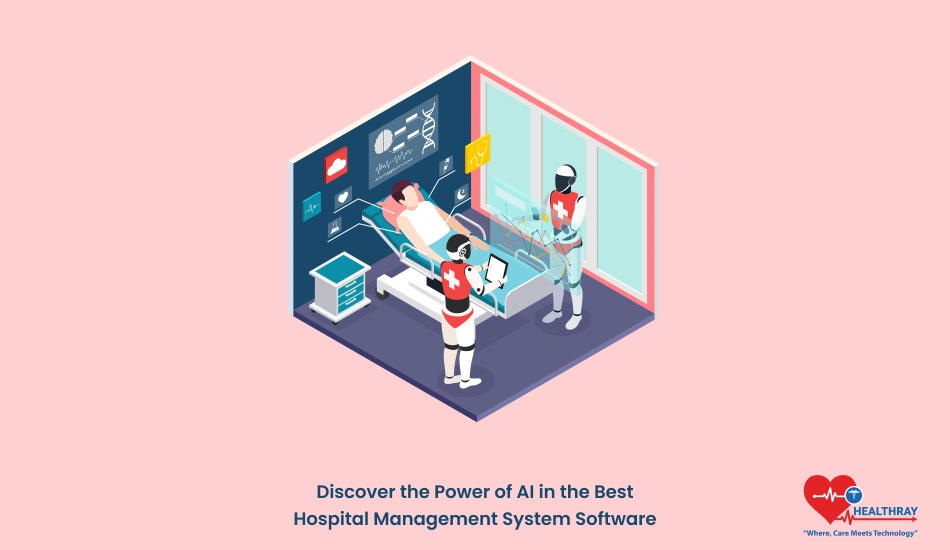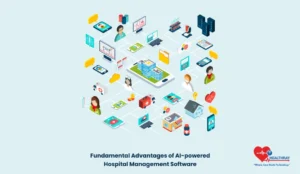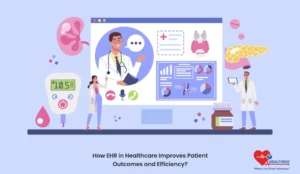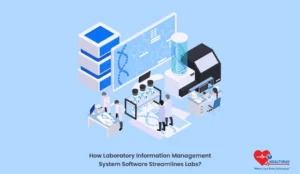Hospital management has always been a complex and challenging task. With the growing demands of modern healthcare, administrators and doctors often find themselves juggling between patient care, administrative responsibilities, and operational efficiency. This is where technology steps in. Specifically, artificial intelligence (AI) is changing the game for hospital management systems (HMS).
But what does this mean for you as a hospital administrator, IT professional, developer, or doctor? Imagine tools that predict patient admissions, automate tedious administrative tasks, and even assist in diagnosing illnesses. That’s what AI is bringing to the table. In this post, we’ll explore how AI is transforming hospital management systems, making life easier for professionals and improving outcomes for patients.
Enhancing Patient Care with AI
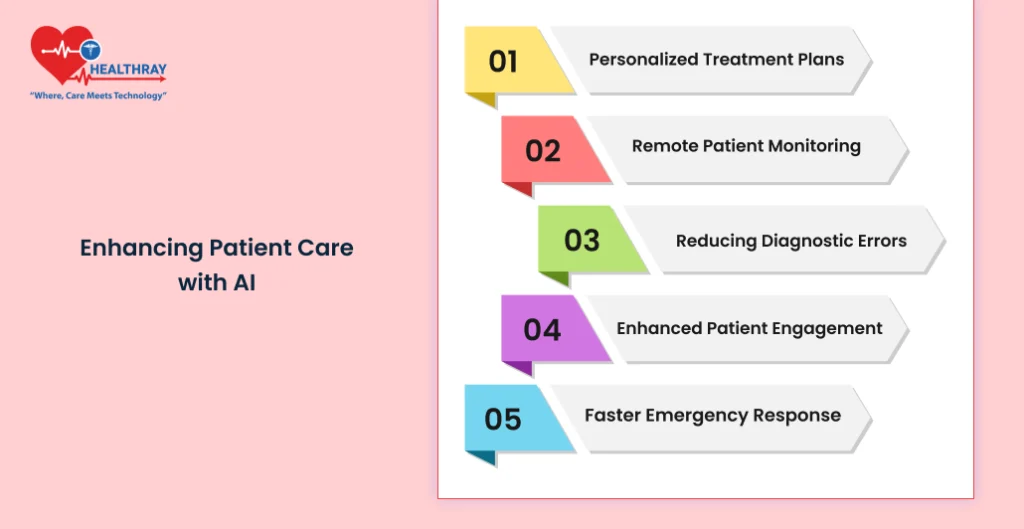
Patient care is at the heart of every hospital’s mission. AI is stepping in to bridge gaps, enhance efficiency, and ensure better outcomes for patients. Here’s how AI makes a difference in healthcare:
Personalized Treatment Plans
AI analyzes vast amounts of patient data, from medical history to genetic information, to create tailored treatment plans. This means patients get the right treatment at the right time, reducing trial-and-error approaches.
Remote Patient Monitoring
Wearable devices and AI-powered applications now enable real-time monitoring of patients outside the hospital. For example, AI can flag irregularities in a patient’s vitals and alert healthcare providers immediately, ensuring faster intervention and reducing hospital readmissions.
Reducing Diagnostic Errors
AI-driven diagnostic tools can analyze imaging scans, lab results, and patient records with incredible accuracy. These tools assist doctors in identifying conditions that might be overlooked during manual reviews. For instance, AI algorithms are already outperforming humans in detecting early-stage cancers in medical imaging.
Enhanced Patient Engagement
AI-powered chatbots and virtual assistants offer instant responses to patient inquiries, schedule appointments, and provide medication reminders. These tools keep patients engaged in their care journey while reducing the workload on hospital staff.
Faster Emergency Response
AI systems can prioritize emergency cases based on urgency, ensuring that critical patients receive immediate attention. This reduces wait times and can make a life-saving difference during emergencies.
By integrating AI into patient care processes, hospitals can deliver a higher standard of care while reducing the strain on their teams. However, balancing technology with the human touch is essential to maintaining trust and empathy in healthcare.
Streamlining Administrative Tasks
Managing administrative tasks in a hospital is often overwhelming. From scheduling staff to managing patient admissions, the sheer volume of work can lead to inefficiencies. AI is revolutionizing how hospitals handle these responsibilities, making processes faster and more accurate.
Automating Scheduling and Appointments
AI can optimize staff schedules based on patient demand, available resources, and historical data. It minimizes overlaps and ensures enough coverage during peak hours. Similarly, AI-powered appointment systems reduce scheduling conflicts and improve patient flow.
Simplifying Patient Admissions
AI streamlines the admission process by automating paperwork, verifying insurance details, and pre-authorizing treatments. Patients can complete the required formalities online, reducing bottlenecks at the registration desk.
Enhancing Billing Accuracy
Billing errors can frustrate patients and lead to revenue losses for hospitals. AI ensures precise billing by cross-verifying treatment records, insurance policies, and coding standards. It helps prevent duplicate charges or missed claims.
Supporting Staff Productivity
AI tools handle repetitive tasks like data entry, report generation, and compliance checks. This allows administrative staff to focus on more critical issues, improving overall productivity and morale.
Improving Communication
AI-driven communication platforms streamline internal messaging, helping staff and departments stay connected. Whether coordinating between labs and physicians or sharing updates with nurses, AI keeps everyone on the same page.
Administrative efficiency directly impacts a hospital’s operational success. By automating time-consuming tasks, AI frees up resources, reduces human error, and enhances the patient experience.
Optimizing Resource Allocation
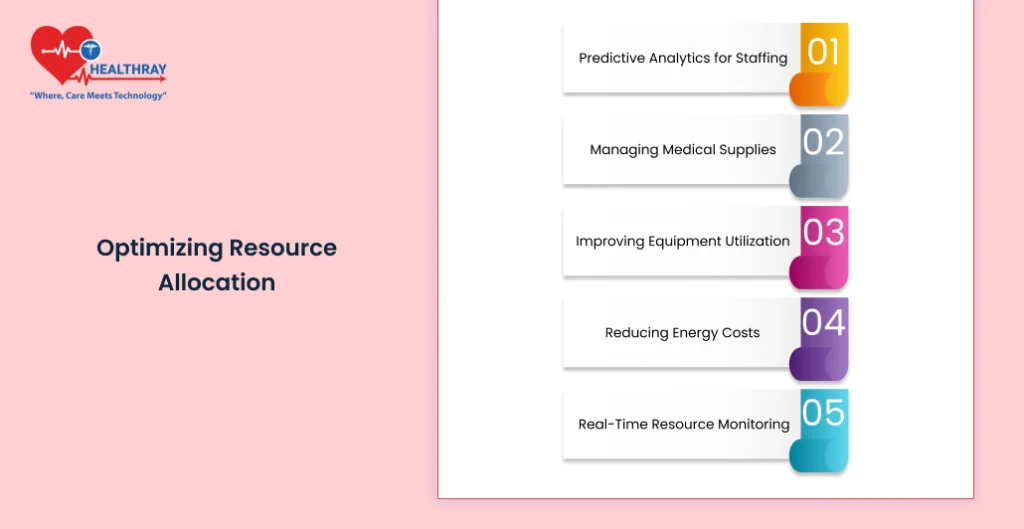
Efficient resource management is critical for a hospital to function smoothly. From staff schedules to medical supplies, the balance must be maintained to avoid overuse or shortages. AI is now a game-changer in helping hospitals allocate resources wisely.
Predictive Analytics for Staffing
AI uses historical data and real-time inputs to predict patient volumes. This helps administrators plan staff schedules more accurately, ensuring there are enough team members during peak times without overstaffing during slower periods.
Managing Medical Supplies
AI tracks the usage of medical supplies and predicts future demand. By analyzing inventory levels and consumption patterns, it helps hospitals avoid both shortages and waste. For example, during flu seasons, AI can forecast the need for specific medications and vaccines.
Improving Equipment Utilization
Expensive medical equipment often sits idle or is overbooked. AI systems can monitor usage patterns and recommend optimal scheduling for machines like MRI scanners or operating rooms, maximizing their availability.
Reducing Energy Costs
Hospitals consume a significant amount of energy daily. AI can analyze energy usage trends and recommend efficient practices, such as reducing HVAC output in unused areas or optimizing lighting systems.
Real-Time Resource Monitoring
AI-powered dashboards offer a live overview of all hospital resources, from bed availability to medication stocks. This enables quick decision-making and avoids delays in patient care caused by resource bottlenecks.
Effective resource allocation isn’t just about cutting costs. It’s about ensuring every part of the hospital works together seamlessly, leading to better care and smoother operations.
AI in Clinical Decision Support
Making the right clinical decisions often depends on processing vast amounts of information quickly and accurately. AI-powered tools are transforming how doctors and clinicians access and interpret data, ultimately leading to better patient outcomes.
Analyzing Patient Data
AI tools can analyze patient records, lab results, and imaging data to identify patterns that might not be immediately visible to humans. For example, AI can spot early warning signs of diseases like diabetes or cardiovascular issues, enabling early intervention.
Supporting Evidence-Based Decisions
AI systems can cross-reference millions of medical studies and case reports in seconds. This helps doctors make informed decisions based on the latest evidence, ensuring patients receive the most effective treatments.
Real-Time Alerts for Critical Conditions
AI monitors patient vitals continuously and sends real-time alerts for abnormalities. For example, it can warn medical staff of a sudden drop in oxygen levels or irregular heartbeats, allowing for swift action.
Enhancing Diagnostic Accuracy
AI-powered diagnostic tools, such as those used for radiology or pathology, have shown exceptional accuracy in identifying abnormalities. By supporting doctors in diagnosing conditions like cancer or neurological disorders, AI reduces diagnostic errors.
Personalized Medication Recommendations
AI uses patient-specific data, such as genetic information and lifestyle factors, to recommend the most effective medications and dosages. This reduces trial-and-error in prescribing and improves patient outcomes.
By acting as a reliable partner to medical professionals, AI in clinical decision support empowers healthcare teams to focus on patient care rather than data overload.
Challenges and Considerations
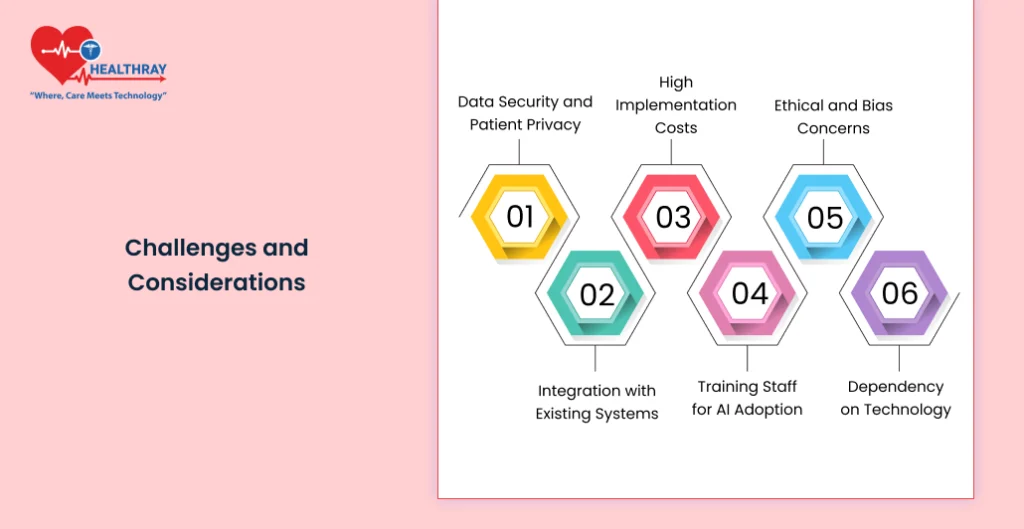
Integrating AI into hospital management systems offers incredible benefits, but it’s not without challenges. Understanding and addressing these concerns is key to making AI work seamlessly in healthcare.
Data Security and Patient Privacy
AI systems require access to large amounts of sensitive patient data. This raises concerns about data breaches and compliance with regulations like HIPAA or GDPR. Hospitals need robust encryption, access controls, and audit trails to protect patient information.
Integration with Existing Systems
Hospitals often rely on legacy systems that may not be compatible with modern AI tools. Integrating AI requires time, resources, and technical expertise to ensure a smooth transition without disrupting operations.
High Implementation Costs
AI solutions can be expensive to deploy, especially for smaller hospitals with limited budgets. Beyond initial setup costs, ongoing maintenance and upgrades can also be a burden.
Training Staff for AI Adoption
Introducing AI into daily workflows means hospital staff must learn how to use new tools effectively. This requires training programs and a cultural shift toward embracing technology, which can take time.
Ethical and Bias Concerns
AI algorithms can unintentionally reflect biases present in the data they are trained on. This can lead to disparities in care or incorrect predictions. Hospitals must audit AI systems regularly to ensure fairness and accuracy.
Dependency on Technology
Over-reliance on AI could lead to reduced human oversight. It’s essential to strike a balance, ensuring technology assists but doesn’t replace critical decision-making by medical professionals.
Addressing these challenges early helps hospitals maximize the benefits of AI while minimizing risks. With proper planning and execution, these hurdles can be overcome.
Future Trends in AI-Enabled Hospital Management Systems
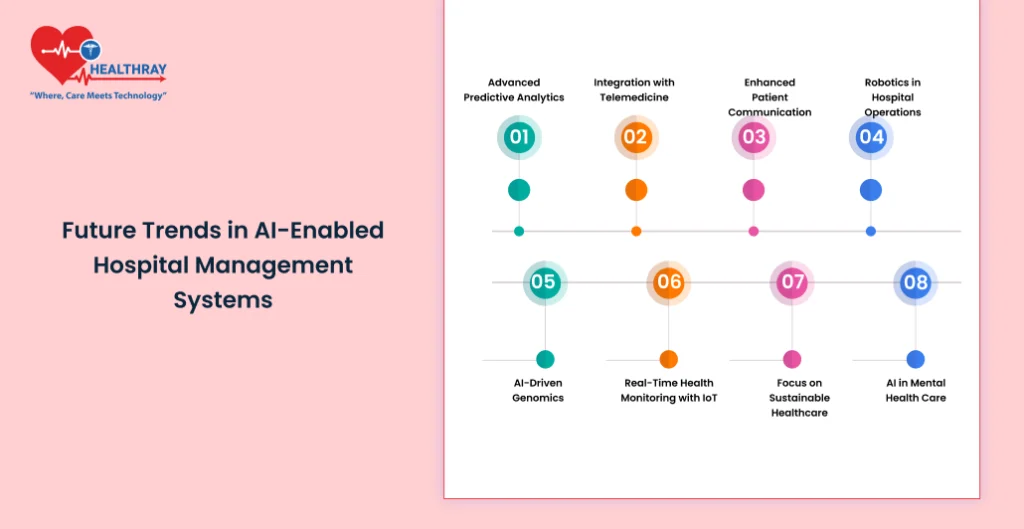
The role of AI in Hospital Management Information Systems continues to evolve, with groundbreaking advancements reshaping healthcare. Let’s explore some key trends shaping the future of AI-enabled systems.
Advanced Predictive Analytics
AI is moving beyond basic predictions to offer highly accurate forecasts for patient admissions, disease outbreaks, and resource needs. These insights help hospitals stay prepared for fluctuating demands, ensuring seamless operations.
Integration with Telemedicine
The rise of telemedicine has paved the way for AI-assisted virtual care. AI tools are now being integrated with telehealth platforms to analyze patient symptoms, recommend treatment plans, and facilitate remote monitoring.
Enhanced Patient Communication
Natural language processing (NLP) is enabling AI to understand and respond to patient queries in real-time. Future AI systems will provide even more personalized communication, improving patient satisfaction and engagement.
Robotics in Hospital Operations
AI-driven robotics are becoming more prevalent in healthcare. From assisting in surgeries to managing logistics like medication delivery, robotics powered by AI are enhancing both efficiency and precision.
AI-Driven Genomics
AI is unlocking new possibilities in personalized medicine through genomics. By analyzing a patient’s genetic makeup, AI can predict susceptibility to certain diseases and recommend targeted treatments.
Real-Time Health Monitoring with IoT
AI combined with Internet of Things (IoT) devices is enabling hospitals to monitor patients in real-time. Smart sensors and wearable technology track patient health continuously, providing early warnings for critical conditions.
Focus on Sustainable Healthcare
AI is being leveraged to optimize energy usage, reduce waste, and improve sustainability practices in hospitals. These eco-friendly initiatives align with global efforts to create greener healthcare facilities.
AI in Mental Health Care
AI-powered tools are starting to play a role in mental health assessments and therapies. Chatbots, virtual counselors, and sentiment analysis tools can provide support for mental health professionals and patients alike.
The future of AI in hospital management promises smarter systems, better patient outcomes, and more efficient operations. Staying ahead of these trends can help healthcare facilities remain competitive and deliver exceptional care.
Conclusion
AI is transforming hospital management systems into more intelligent, efficient, and patient-focused platforms. From enhancing patient care to streamlining administrative processes and optimizing resource allocation, its impact is undeniable. By embracing predictive analytics, real-time monitoring, and personalized decision-making, hospitals can improve operational efficiency while delivering better outcomes for patients.
However, integrating AI is not without its challenges. Issues like data security, high costs, and the need for staff training must be addressed to ensure successful implementation. As AI technology continues to evolve, hospitals that stay ahead of these trends will lead the way in delivering exceptional care.
The journey toward AI-enabled hospital management isn’t just about adopting technology. It’s about creating a smarter, more responsive healthcare system where professionals can focus on what truly matters—saving lives and improving patient well-being.
